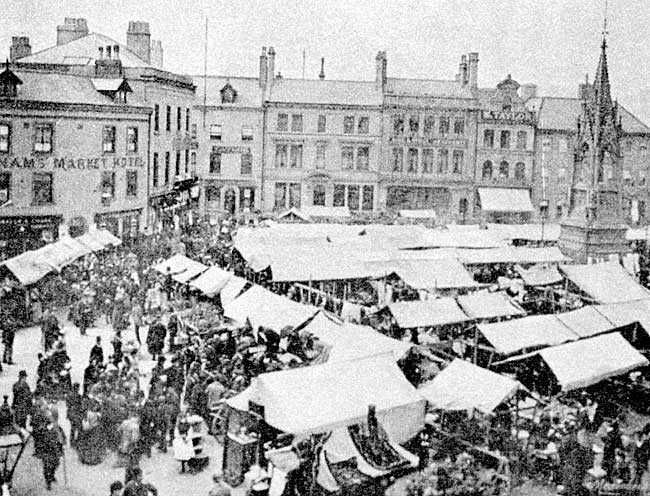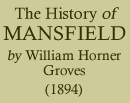< Previous | Contents | Next >
Public Undertakings
MARKET PLACE

The Market Place.
CONSIDERING the size of the town, Mansfield Market Place may be said to rank amongst the finest in the country. It is surrounded by handsome buildings of a comparatively new and substantial character. It was formed out of a block of old buildings, and was one of the first undertakings of the Improvement Commissioners. Previous to these buildings being cleared away, the only public highway through the town to the Nottingham Road was down Church Street and up Blind Lane. The cost was most reasonable considering the great improvement wrought. In the centre of the Market Place, when first constructed, there was an old pump, which gave place to the monument. Formerly, the market tolls were taken by the lord of the manor; but early in the second half of the century these were acquired by the Commissioners, who now farm them out, and pay the lord of the manor a yearly rent.
Markets are held weekly on Thursday and Saturday, that on Thursday being the largest.
RAILWAYS
Mansfield is connected with other parts of the country by means of the Midland Railway, and has a large, fine station. The first line constructed into the town was the Erewash Valley, in 1847; the others following in this order:— Nottingham branch, 1848; Chesterfield branch, 1862; Newark branch, 1871; Worksop branch, 1874; Teversal branch, 1886; others, 1888 and 1890. It is still felt that additional facilities are needed; and in 1891 the Improvement Commissioners appointed a Railway Communication Committee, with a view to inducing some other company to tap the town, and so assist in its growth and importance. It is possible that in the course of the next few years something may be done in this direction. Previous to 1847, some provision was required to convey coal from Pinxton Wharf to Mansfield; the canal—the means of transit on the other side— only extending as far as the wharf. A tramway was accordingly laid, and a number of iron waggons were provided. These were drawn by horses as far as Kirkby Summit, whence they came by their own weight to Mansfield. On the road, men walked by the side to control the speed by means of blocking the wheels with pieces of wood. On market days, a van was attached in which those who desired could ride. The empty waggons were drawn as far as the summit, and descended to Pinxton by their own weight. Before quitting the subject, it may be interesting to mention that the Midland Hotel now stands where formerly stood Broom House, which was used as a private asylum for males ; and Miss Dickons' house was used as a similar institution for females. The asylum, founded in 1858, was under the management of Dr. Edison, who subsequently removed to Leeds. It was enclosed within its own grounds, and surrounded by a very high wall which effectually prevented the escape of the patients. When the railway was extended to Worksop the grounds and premises were purchased, and ceased to be used as an asylum. The entrance to the asylum was in Belvidere.
CEMETERY
The cemetery is situated about a mile out of the town, on the Nottingham Road, on a plot of land allotted to the Improvement Commissioners on the 1st of December, 1857. It contains ten acres, of which four acres, one rood, and twenty perches are reserved for the use of Dissenters, and five acres, two roods, and twenty perches for the use of members of the Church of England. The cemetery contains two mortuary chapels, connected by a gateway and surmounted by a handsome octagonal spire. There are separate lodges for the superintendent and gravedigger. The total cost of the cemetery and buildings was £3,500. The road to this habitation of the dead is a capital one, and in summer time the favourite promenade of both young and old Mansfield. On the summit of the hill in the cemetery is erected a substantial and handsome mausoleum for the remains of Sir E. S. Walker. The grounds are most tasefully laid out and planted with trees and shrubs, and there are some handsome tombstones to be seen.
GAS WORKS
About the year 1823, Mansfield was first lighted with gas, the Mansfield Gas-light Company being formed with a capital of about £15,000, divided into three hundred shares of £50 each. The works were erected in the Waggon and Coals Yard, Ratcliffe Gate, and the price charged per thousand feet was ten shillings. This company continued to supply gas down to the year 1878, and reaped a handsome profit out of their undertaking. Considerable dissatisfaction, however, prevailed for many years at the very inferior quality of the gas supplied and the excessive price charged. As the result of an agitation, the Commissioners decided in 1878 to purchase the undertaking for the sum of £37,500, paying also £ 1,000 in discharge of a mortgage debt and £2,750 for the discharge of money borrowed by the company. To enable them to do so, they obtained an Act intituled "The Mansfield Commissioners' Gas Act, 1878," under which they became the purchasers. Since the works passed into their hands they have spent a sum of £5,000 on improvements. The number of street lamps has been increased from 180 in 1877 to 313 at the present time. After paying the working expenses and interest on borrowed money, the Commissioners have carried on the works with a profit up to Lady Day, 1890, of £3,000, in addition to paying £6,400 into the capital recouping fund, reducing the minimum price of gas from 4s. 1d. to 2s. 11d. per thousand cubic feet, and improving the strength and power of the light to eighteen candles. Previous to the town being lighted with gas, there were a few oil lamps hung out above the doors of the inns in the town and the yards leading up to the inns.
WATERWORKS
It is an extraordinary fact that, prior to the year 1870, the only water supply possessed by the town was by means of private wells sunk in the white and red sandstone which underlies Mansfield. The supply was plentiful for all purposes, but the water was of a very hard and unsatisfactory quality. On the 12th of May, 1870, therefore, an Act was obtained for the supply of water to the town, and a company was formed for that purpose, with a capital of £ 12,000 in one thousand two hundred shares of £10 each, and power to borrow £3,000 on mortgage. In 1888, great dissatisfaction existed with respect to the supply of water, which, it became apparent, was failing, and that the works had become quite inadequate and unsafe. The advisability of the Commissioners acquiring the undertaking was thoroughly discussed, and eventually this course was adopted. The shares were purchased by the Commissioners at £2.2 10s. each on £27,000 capital, in addition to which they paid £2,100 mortgages and £750 expenses on capital accounts. The undertaking was conveyed to the Commissioners on the 1st of October, 1889 ; and, for the purpose of paying the purchase money, the sum of £30,500 was borrowed, and is being repaid in yearly instalments of £825. The whole sum will be paid off in 1919. Energetic steps have been taken at the present time to augment, and eventually supersede, the present source of supply, for which a very large loan has been sanctioned by the Local Government Board.
RECREATION GROUNDS
Lands have been reserved by the Allotment Commissioners for the use of the inhabitants of Mansfield as recreation grounds, &c, as follows:— 1854. A piece of land known as the "Race Course," situate between the Southwell main road and the Eakring Road, together with a number of smaller pieces of land in the immediate neighbourhood, comprising in all about thirty-six acres. These were allotted to the Duke of Portland under the Act of 1854, with a right of user by the inhabitants of Mansfield as a public recreation ground. A plot of ground, containing about two acres, near what is known as Thompson's Grave, situate off the Southwell Road, was allotted to Brunt's Trustees, with a right of user by the inhabitants of Mansfield as a public recreation ground. In the year 1880, the Commissioners leased from the Duke of Portland a piece of land on the Nottingham Road, containing nearly four acres, for a term of twenty-one years, at a rent of £10 per annum for the purpose of a public recreation ground; and another piece of land, about the same size, in Bancroft Lane, is rented at £14 per annum for a similar purpose. This land is the property of Mrs. Redgate. These grounds are greatly appreciated by the youth of the town, who spend their leisure hours here playing the various out-door games popular in the district. The grounds at a distance from the town are not so much frequented by the young as are those in the town.
CATTLE MARKET
The cattle market was formerly held in Westgate, in the neighbourhood of the Old Cross; but such an intolerable nuisance did it at length become that at length the manorial rights were purchased, and in the course of time a piece of land was obtained on the Nottingham Road costing £ 1,700. Here were erected pens, a lodge, settling rooms, a place for the sale of refreshments, and other conveniences. This was opened in 1877, and is one of the greatest improvements effected by the Improvement Commissioners. Before the market was removed, however, there was great opposition, and a number of comic skits were published, some of them full of merit.
FIRE BRIGADE
Mansfield possesses an efficient fire brigade, furnished with all suitable appliances for extinguishing fires and saving life. Happily these are not often needed, fires of a serious character seldom occurring in the town. The engine-house and the captain of the Fire Brigade are in telephonic communication with the Police Station, so that warning of fire is given without delay as soon as received.
FREE LIBRARY
On the 28th of October, 1891, a Free Public Reading Room and Library was opened in the Mansfield Corn Exchange by Mr. J. Potter Briscoe, chief librarian of the Nottingham Public Free Libraries, in the presence of a very large gathering. This institution is due to the untiring exertions of Mr. G. H. Hibbert, provisional mayor, to whom Mansfield also owes its Charter of Incorporation. The first application for a book was handed in, the evening the library was opened, by the author of this work.
